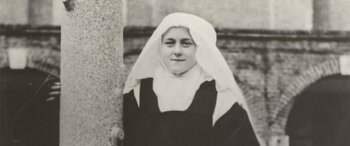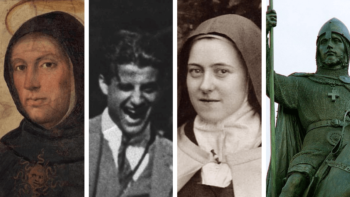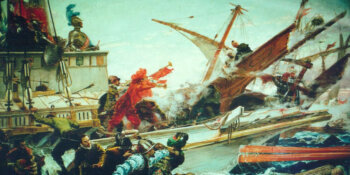
Perseverance is a key virtue for the Christian. That’s because building virtue and seeking progress in holiness is not accomplished without a fight.
After all, the greatest goods in life are often the most difficult to achieve and take the longest to accomplish.
For example: pursuing an education, raising virtuous children, being a supportive caregiver, and fostering a holy marriage. We need constancy of will in order to overcome the obstacles that stand in our way without giving up.
Hence, the virtue of perseverance is defined as the good habit which helps us “to persist in something difficult” as long as necessary to achieve the good thing for which we aim.
Perseverance is an “unchangeable persistence” that helps us to endure the afflictions of life and to keep going; it is the virtue of a soldier who continues to fight until the battle is finished.
Perseverance also sustains us with interior strength until a strenuous task is accomplished, or a persistent difficulty is overcome. It helps us to courageously and continually strive for the good thing we are aiming for, no matter how long it takes to obtain it.
One of the saints best known for heroic perseverance in the most difficult, painful, and dangerous circumstances is St. Isaac Jogues: Jesuit missionary to the New World, and one of the North American Martyrs.
The Life of St. Isaac Jogues
St. Isaac Jogues (1607 – 1646) was born in Orleans, France. As a child he was known for his happy disposition and his attraction to suffering. He loved to listen to the narratives of the Passion of Christ and the sufferings of the lives of the saints. He sought occasions to suffer little things for God’s sake; for example, when he was reproved or punished for any fault, he would express gratitude as if a great service had been done to him.
Isaac received his education at a Jesuit academy, and quickly became distinguished among the other students. Discerning a vocation to the religious life, he entered the Society of Jesus at the age of seventeen. He came under the direction of Father Lalemant, a Jesuit priest who had a gift for identifying and forming the order’s future missionaries and instilling in them a spirit of self-denial and zeal.
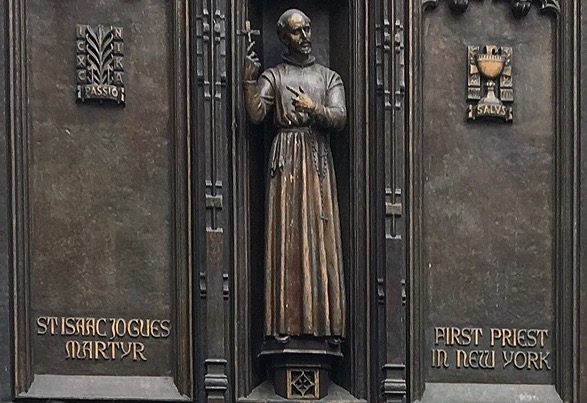
Isaac was drawn to the idea of being a missionary, and prepared himself accordingly with studies and training. At that time the Jesuits were sending missionaries into the most perilous mission fields. One of these territories was New France (Canada) where they sought to evangelize the Huron and Algonquin Native American tribes.
After completing his studies and being ordained a priest, Isaac’s desire to become a missionary was about to be realized.
His Mission Work Begins
In 1636, Fr. Isaac Jogues set sail for the Jesuit mission in Canada. The Jesuit settlement included eighteen priests and six lay brothers working in six outposts spread over a thousand miles, from the Atlantic to Lake Huron. Just days after landing, Isaac was assigned to work among the Huron tribe, numbering 35,000 souls.
The work of the Jesuit missionaries was to learn the native languages, baptize new converts, catechize and prepare them to spread the Christian faith among their people, and assist the villagers when they became sick with the little medicine they had.
Missionary life in the Canadian wilds was one of great deprivations, but the Jesuit fathers adapted to the ways of the natives as much as possible. They lived in the same simple bark huts with only a mat for a bed, and a few animals skins for coverings. Their food was meager, and the biting insects interrupted their sleep. The fire in the cabin filled it with an almost unbearable smoke that made it difficult to read or breathe. Fr. Jogues “adapted himself to all this with the greatest ease. It seemed as if he had lived many years among them.”
One of the dangers that constantly beset the Jesuit missionaries and undermined their work was the hostility of the Iroquois, the fiercest and most violent Natives of the region. Other Native Americans were afraid of them. The Iroquois constantly made war on the Hurons and the Algonquins, among whom the Jesuits worked. These Iroquois, especially the Mohawk tribes, formed bands of warriors who laid ambushes along the river routes to capture their enemies and steal their cargo. Above all, they were anxious to capture a “black-gown”—the Jesuit priests for whom they had a special hatred.
The greatest test of Fr. Jogues’ perseverance was soon to come. The Jesuit mission was in dire need of supplies which could be obtained from the larger settlement in Quebec. The route there, however, was overrun with Iroquois warriors. Isaac was given the choice to accept or deny the mission, as it might cost him his life. He accepted, and prepared for the journey with an eight-day retreat to strengthen his soul.
A party of brave Huron warriors and a few Frenchmen were appointed to take the six-hundred-mile journey. They made their journey to Quebec safely—only to be ambushed on the return trip by a large Mohawk war party.
A brave and bitter fight ensued; some of the party were able to flee, while others were captured.
Fr. Jogues concealed himself and nearly escaped; however, when he saw some of his companions being taken captive, he withdrew from his hiding place and gave himself up, saying that he wished to share his companions’ captivity. When he attempted to encourage and support one of his fellow prisoners, however, the Mohawks reacted ferociously.
They…stripped him of all his clothes, except his shirt, and discharged upon him a volley of blows with fists, sticks, and war-clubs. Father Jogues fell to the ground insensible. He was just coming to, when two young braves, who had not been there to take part in the first onslaught, sprang at him like two wild beasts, tore out his nails with their teeth, and crunched the two forefingers until they had completely crushed the bones of the last joint.
The Life Of Father Isaac Jogues by Rev. Felix Martin S.J.
After this, the Mohawk war party made the return journey to their home country with Fr. Jogues and the other captives in tow.
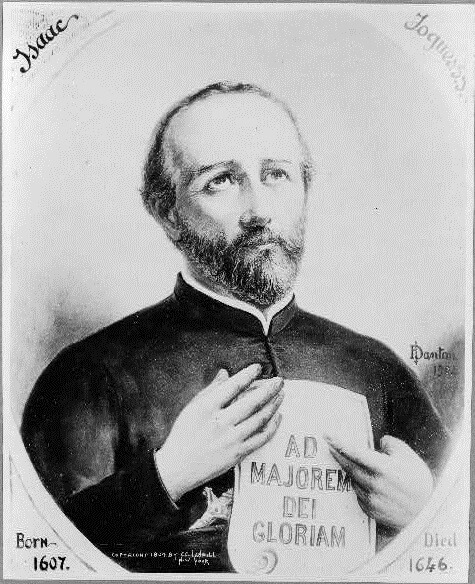
When they met a larger encampment of Mohawks on the way, the captives suffered fresh tortures. In Fr. Jogues’ words, this was a divine test of their perseverance:
“They showered blows on us so that I fell under their number and cruelty, on the rocky path leading to the hill. I thought that I must surely die under this frightful torture. Either from weakness or cowardice, I could not rise. God alone, for whose love and glory it is sweet and glorious to suffer thus, knows how long and how savagely they beat me…I would never end were I to tell all we Frenchmen had to endure. They burned one of my fingers, and crushed another with their teeth. Those that had been crushed before were now so violently twisted that they have remained horribly deformed, even since they healed. My companions shared the same treatment. But God showed us that He had us in His care, and that He wished not to discourage but to try us.”
St. Isaac Jogues
Fr. Jogues shed no tears for his own sufferings, but only for those of his companions. He encouraged them and reminded them of the rewards God had prepared for their sufferings for His sake. The death march continued into weeks, and on the vigil of the Assumption the party arrived at the Mohawk home country. The whole settlement, men, women, and children, came to greet the prisoners with sticks and fresh blows. Fr. Jogues was given the worst beatings.
For the next seven days the prisoners were taken as trophies to the other Mohawk villages. They were subjected to beatings during the day, and tortures by the children at night.
Fr. Jogues handled his captivity with heroic perseverance. Ready for martyrdom at any moment, his faith was never shaken. He repeatedly exhorted his companions to courage for the love of Christ, and gave them all absolution as they began to be killed off. Some of the Hurons among their party were martyred, while Fr. Jogues and the remaining Frenchman were kept as slaves.
From day to day, the two captives never knew if they would live or die. Fr. Jogues’ companion was eventually killed, leaving him to be the last man standing. He did not know the Iroquois language, so he could not speak to his captives or make any significant efforts to begin to share the faith with them. All his actions were regarded suspiciously. He was “adopted” into a family to be their slave; they were kinder to him than the others and protected him as best they could.
Yet there were some among the Mohawks who were ready to kill him at a moment’s notice if he was not careful where he went.
Finding Light in the Darkest Places
Deprived of the sacraments and his holy companions, his weak body subjected to hard labor, Fr. Jogues sought to keep his faith and spirit alive as best he could. His only consolation was a copy of the Book of Hebrews which he always kept with him.
When winter came he endured new sufferings from the bitter cold. Slowly his perseverance began to wane. He began to suffer from great interior anguish, tormented with doubts about his salvation, and feelings of being rejected by God because of his sins. For the first time in his life, he began to fear death.
At one of the lowest and most depressed moments of his captivity, while kneeling in the makeshift chapel he had managed to build, he had a dream which gently and lovingly rebuked him, and inspired him with words of courage from Scripture. In this moment he realized that his perseverance was waning because, as he explained, “I was giving way to excessive fear. I lacked confidence in God.” The holy dream renewed his missionary zeal, and he was ready to face his incomparable sufferings with new joy.
Fr. Jogues continued to endure hardships and deprivations as a slave. He was forced to travel long and dangerous journeys between villages, in snow and ice, carrying burdens as though he were a pack animal. He also had to watch as new victims captured in the Mohawk war parties were tortured and burned to death in front of him. As a priest he stayed near the victims to assist them in their sufferings, even baptizing some if he was able, which he did for one woman as she was about to take her last breath in the flames.
Isaac persevered in this brutal captivity, maintaining his fervor and faith as best he could, for over a year.
Back in Europe…
Everyone in Quebec thought that Fr. Jogues was dead.
When they learned that he was still alive and held captive by the Mohawks, efforts were made to negotiate his release through other Native Americans who acted as middlemen with the Mohawks. They gave him the name “Ondesonk” meaning “indomitable one” because he had survived his captivity against all odds. The negotiations failed, but Fr. Jogues escaped with the help of Dutch settlers. He managed to board a ship and made the long and dangerous journey back to Europe.
He stepped onto French soil on Christmas morning. His first thought was to go to Mass and receive Holy Communion. He inquired from the local peasants where the nearest Catholic Church was, and they delightedly accompanied him to Mass. Fr. Jogues rejoiced to be among faithful Catholics once more, and to receive the Holy Eucharist which he had been deprived of for so long.
“At that moment,” he recalled, “I seemed to begin once more to live, and to enjoy all the happiness of my deliverance.”
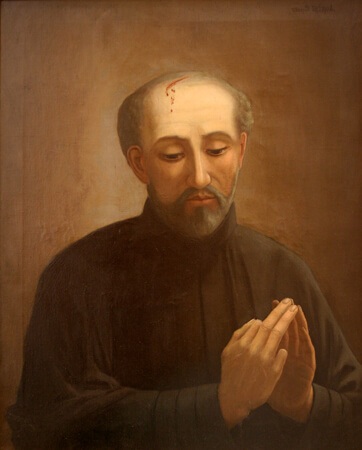
Fr. Jogues was then taken to the nearest Jesuit college where his fellow Jesuits rejoiced to see their companion alive.
He could not say Mass, because he was missing the fingers necessary to hold the Blessed Sacrament according to the rubrics. The Jesuits wrote to the Holy Father to obtain permission for Fr. Jogues to say Mass with his remaining mutilated fingers. Permission was quickly granted.
Fr. Jogues became famous. He was honored as a “living martyr” and everyone praised his heroism.
Yet after all the indescribable pain and deprivation he had heroically endured, Fr. Jogues could not remain in France receiving endless praise while his mission field still lay across the Atlantic.
A few months later, in 1644, Fr. Jogues returned to the Jesuit mission in Canada, for “his heart was more inflamed than ever with the desire to labor for God’s glory.”
By the time he returned a peace treaty had been negotiated with the Iroquois, and Fr. Jogues was able to do mission work among the Mohawks.
However, his successes were short-lived.
When the Natives suffered a crisis of crop failure and epidemic disease, they blamed him, saying he had caused it with his sorcery.
One of the Mohawk families plotted to kill him under the pretext of inviting him to visit their cabin. As soon as he set foot under their roof, they laid a tomahawk into his skull.
God rewarded Fr. Jogues with glorious fruit for his sacrifice. His murderer later felt remorse for his crime, received baptism, and took the baptismal name of “Isaac.”
Years afterward, more spiritual fruit would come from Fr. Jogues’ mission field: St. Kateri Tekakwitha, the first Native American canonized saint.
St. Isaac Jogues became known as the “Apostle to the Mohawks” and the patron of the Americas and Canada. He and his companions were the first martyrs of the North American mission officially recognized by the Church.
“Faith That is Tested Produces Perseverance”
St. Isaac Jogues had an indomitable soul. His God-given mission was to bring the Catholic faith to the Huron, Algonquin, and Iroquois tribes of the New World. To achieve his mission he bravely endured many long years of deprivation, danger, and sacrifice. We are not all called to the mission field or to suffer martyrdom like St. Isaac Jogues, but we are all called to practice perseverance as he did.
No Christian is exempt from this. We will always face trials, difficulties, obstacles, and pain as we strive to carry the crosses that God has called us to. And we will always suffer temptations against our faith. We can apply the same heroic perseverance that St. Isaac Jogues demonstrated to our own unique sufferings and take inspiration from his example.
St. Isaac’s strength during his hardest battle was Sacred Scripture. We should also turn to the Word of God for encouragement in dark moments. “Consider it all joy, my brothers,” says St. James the Apostle, “when you encounter various trials, for you know that the testing of your faith produces perseverance. And let perseverance be perfect, so that you may be perfect and complete, lacking in nothing” (James 1:2-4).
God sent Isaac Jogues the trials that were necessary for him to become the saint that he was called to be. Likewise, God sends us the trials that are necessary for us to become the saints that He calls us to be. Our duty is to persevere through them.
St. Isaac Jogues, pray for us!
This article was taken from the powerful series Heroic Virtue: Learning Virtue Through the Lives of the Saints. You can sign up for this digital course here!

